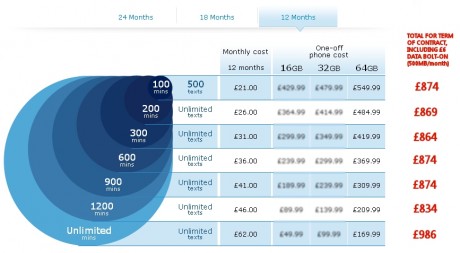Capitalism is weird, part 57
This page lists the various contract tariffs for the imminent iPhone 4S on O2. If you add them up, you get some pretty strange results.
(For the purposes of these calculations, we've worked out the total cost for the term of a 12-month contract, including a £6 "Bolt-On" for 500MB of data, and based on purchasing the 64GB model.)
A little zany, isn't it? Choose to pay £65 less up front, but £5 a month more for 12 months (total £60) and you get twice as many minutes and more texts. Pay another £5 less in total over the contract and you can have another 100 minutes a month on top. Pay exactly the same in total as the 100-minute/500-text option and you can get 600 minutes and unlimited texts instead. Or 900 minutes and unlimited texts, again for the exact same total amount of money, but paying far less of it up front.
And if you'd like 1200 minutes every month instead of 100, and unlimited texts instead of 500? You can have that for £40 less in total, and while laying out just £210 initially rather than £550.
Can anyone explain this to me? Presumably Apple charge O2 the same amount for the hardware regardless of how many minutes are on the tariff, so what possible benefit do O2 get from giving you far more airtime for less money? Surely all they're doing is losing out on earning interest from the upfront payment, as well as getting less in total? Buh?
(Weirder still, if you get a 24-month contract the prices DO go up steadily as you add minutes – over 24 months the 100-minute tariff comes out at £1,036 all in, while the 1200-minute one is £1,288. With an 18-month contract it's similar, except that for some reason 900 minutes cost slightly less than 600 minutes.)
Capitalism is seriously messed-up.
(Incidentally, the 64GB version of the 4S will cost £699 to purchase outright and unlocked. For another £180 – ie about the same total as most of the O2 tariffs – you'd get 12 months of PAYG service from Giffgaff, providing 400 minutes, unlimited texts and unlimited internet, through the O2 network, but with the freedom to change provider any time you like and with much lower costs after the first year. Or if you're a low user, you could spend £120 instead for 250 minutes with unlimited texts and data and free calls to other GG users. The O2 contracts, however, do offer tethering to balance their limited data.)









Giving you more minutes/txts basically doesn't cost them anything – they've already paid for the infrastructure.
Uh but I guess that doesn't really make any difference. Maybe they are hoping people won't switch/upgrade as soon as their 12 months are up, so they are anticipating 3-6 months of higher monthly payments (average) on top of the minimum contract? That might be enough to swing it.
Or they hope people get used to the extra minutes and will go for a more expensive contract next time?
Don't think that fully explains it though. Probably some complicated financial thing to do with different budgets. Earnings per subscriber used to be a very important measure for investors when comparing different networks to invest in, but I thought they'd moved away from that because subsidies obviously make a mockery of it.
I'd imagine prior experience (or some complete bullshitter calling themself a consultant of some kind – but I repeat myself) has shown them that most people tend to stick to certain payment/usage plans, so the sums have been fiddled to make more money of those plans.
There are probably more people who go "fuck it, give me everything" than there are people who work out that going one level down is more efficient – or they've deliberately introduced anomalies to appeal to the people who like to feel that they've worked out a clever deal.
Making a profit with pricing schemes like that can be as much about psychology/behaviour as they are about logical calculations.
There's a good piece about this is a book I have, I'd have to go upstairs to find the title but I will if you want it. . It discusses the nature of perception of value for money, and explains why we'll happily pay another £500 when buying a second hand car without thinking about it, yet still clip out coupons for a half price can of soup. One of the experiments they did was to take groups of 100 people and ask them to choose which they would buy from the following list:
Subscription to The Economist, Online only, next 12 issues, plus unlimited access to back catalogue of issues – £50
Paper Subscription to the Economist – £120
The results were mixed as people chose the pack they preferred.
Then the same test was done with a different group of people, and a third price point added:
Subscription to The Economist, Online only, next 12 issues, plus unlimited access to back catalogue of issues – £50
Paper Subscription to the Economist – £120
Online and Paper Subscription together £120
Over 90% of customers now chose the the £120 package. The perception of the good value product is massively influenced by a "trick" third price, for a package that isn't actually there to be bought, it's just there for the illusion of making the high priced option a better value proposition.
That's what this is about…. I reckon. For example, if they only offered 2 packages, one with 50 texts and one with 5000, they would alienating all the customers who think 5000 texts is too many. But if they do a load of other packages, and the bloke in the shop recommends, "ah, but for an extra £5 a month, you could get 5000 texts", then they will sell their top of the range bundle more of the time, regardless of the customers needs.
Oooh, here it is http://danariely.com/the-books/excerpted-from-chapter-1-%E2%80%93-the-truth-about-relativity-2/
"Making a profit with pricing schemes like that can be as much about psychology/behaviour as they are about logical calculations."
None of that explains why they don't do the same thing with the 18-month and 24-month contracts, though. Why would you make a 12-month contract more attractive?
"then they will sell their top of the range bundle more of the time, regardless of the customers needs"
But that's the thing – the top-of-the-range bundle (discounting the "unlimited" one, because who the hell needs more than 1200 minutes?) makes them LESS money in both the short and long terms, and requires them to provide MORE service. So why do they want to sell more of that one?
Why would you make a 12-month contract more attractive?
Perhaps it's a sales thing. If your contract expires after 12 months, you'll probably call them (before or after they've shafted you for an extra 2 months) to sort out a new one. They can then flog you an 'upgrade' without having to cold call you.
Maybe they're confident they have enough network capacity over the next 12 months, but not over a longer time frame, so they're charging more for a high-capacity, long-term contract?
I think the real answer is that companies keep their mobile plan pricing deliberately complicated so it's hard for customers to make a direct comparisons. If they had to publish a simple per-minute/per-megabyte price, they're worried there would be a "race to the bottom". So they offer a complicated variety of plans which all basically amount to the same total revenue.
The only reason I could think of is that the cheaper monthly tariffs are designed to appeal to a younger audience where the phone part is bought as a Christmas or Birthday (or combined) present but the monthly cost has to be met from pocket money, paper rounds, part-time jobs and so on. Possibly easier to find £27 a month and have a bit left over for apps, the cinema, McDonalds and the occasional visit to the tuck/cider shop at that age.
Mind you, the smarter youngster would still go for the 1200 minute package if his or her parents were willing to pony up the £209.99 for the phone and pay half of the monthly bill. That would work out at £521.99 for the present and only £26 per month for the youngster's part of the contract.
The customer's perception is that the more individual deals the store has, the more chance there is that one of these deals will be a perfect match for them.
So you are in the market for an iPhone4, and you go into 02's shop for a browse.As you've quite rightly noted, there's only a couple of packages on that list you would actually need to buy – all the others offer less value. However, you find yourself in the shop faced with a number of different offers, and this makes it more difficult to choose., especially as the other shops all have their own deals as well. Then, the bloke in the shop comes over and says, "No pressure, no hard sell, but you see that deal there? It's actually only a 12 month contract, and it works out less overall than all these others – I know this doesn't make sense, but in the minefield of mobile phone deals, that one there is the one to buy!" The customer makes an informed choice, the shop sells exactly the deal they want.. The other deals are only there to make the main package they want to sell appear to be better value. It makes it a no-brainer.
However, if 02 were clear about this from the start, they would only advertise the 2 deals. This means that Carphone Warehouse next door with their 20 different deals, appears to be the better place to go in order to get the right package.
The theory of the book I linked to is seen all over the place, not just in prices, but any number value you can compare. This is why my 3 mobile offer of 5000 texts per month is better value than 02's 2000 texts per month for the same price – even though 02s network is better and I send about 80 texts a month at best.
I reckon that 3 tried the same idea on data usage, being the only company that offers all-you-can-eat on data for no apparent extra cost. This looks to have bitten them on the arse now, as people start tethering their wifi only ipads and laptops and going crazy with the usage. I bet they only expected people to dowload emails occasionally,
1200 is only an hour a day in the working month. Amazingly easy to rack up if you're employed and out and about and relying on a cellphone.
1200 minutes is only an hour a day in the working month. Amazingly easy to rack up if you're employed, out and about and relying on a cellphone.